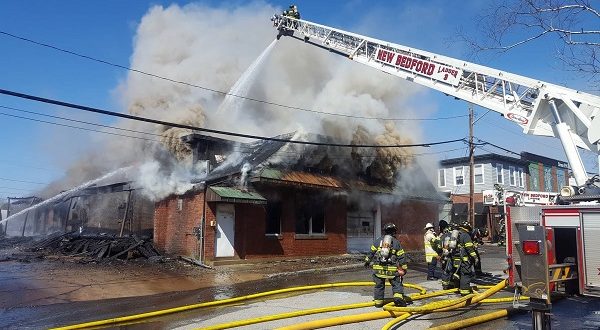Want to end the New Bedford Fire Department blackouts? If homeowners took on the full burden, it would cost the average New Bedford homeowner $117 a year to end the blackouts.
According to the New Bedford Mayor’s office, the City of New Bedford is saving $2.7 million annually by having a rotation of fire stations in New Bedford close on a planned rotation. The idea is to have a single fire station close daily with the nearest fire station taking on the extra geographic responsibility.
This is being done due to federal grants drying up that once funded dozens of fire personnel and to partially fund the payments on the $17 million public safety complex in New Bedford’s south end which will allow New Bedford to close Fire Stations 3, 6 and 11, and police Station 2 – consolidating these functions at 890 Brock Avenue. The issue is there have been fire-related deaths while a nearby station was blacked out fully or partially. Most recently, a December 28, 2019 fire at 143 Myrtle Street claimed the life of an elderly man.
“Over the past few years, we’ve had four fatalities while stations were blacked out,” Ward 3 City Councilor Hugh Dunn stated at the January 9th New Bedford City Council session. “Since October, we’ve had two fatalities in Ward 3 while stations were blacked out. Enough is enough.”
Currently, there are 23,022 homeowners paying property taxes in New Bedford. Simple math means homeowners on average would have to pay an additional $117 a year to end the blackouts.
According to Zillow.com, the average home value in New Bedford is $252,035. If your home is worth more than $252,035, you’d pay more than the $117. This doesn’t take into account the burden of a business property tax or other ways to pay for the cost of the blackouts and assumes the homeowners would take on 100% of the burden. Residential and commercial property owners would likely take on the burden together, but the split would have to be decided by your New Bedford elected officials.
On average, homeowners in New Bedford will see an increase of $114 in 2020. In 2019, the average homeowner saw an average increase of $220 making the increase $334 over the past two years. Last year was an election year and would have made it difficult for Mayor Mitchell to raise property and commercial taxes higher to end blackouts. With a full four years ahead of him, 2020 could be the year Mitchell softens his stance.
Would you be willing to pay higher taxes or rents to end the fire station blackouts in New Bedford? Sound off in the comment section below!
 New Bedford Guide Your Guide to New Bedford and South Coast, MA
New Bedford Guide Your Guide to New Bedford and South Coast, MA










No I don’t think homeowners so be responsible to increase taxes to pay for the blackouts. I already pay $4000 a year for a single house in New Bedford south end and my sidewalks are not even paved! The city says I’m responsible to pay for the sidewalks to be done! Why should I be responsible to pay? I thought the sidewalks belong to the city? If I have to pay are my taxes going to be lowered or they are going to get raised?
I think it’s only right if city has there employees do the job isn’t that why we pay for? They have the supplies and the workers. It’s like double dipping. City employees are receiving a pay to do city work and now I have to pay to have city’s sidewalks paved?